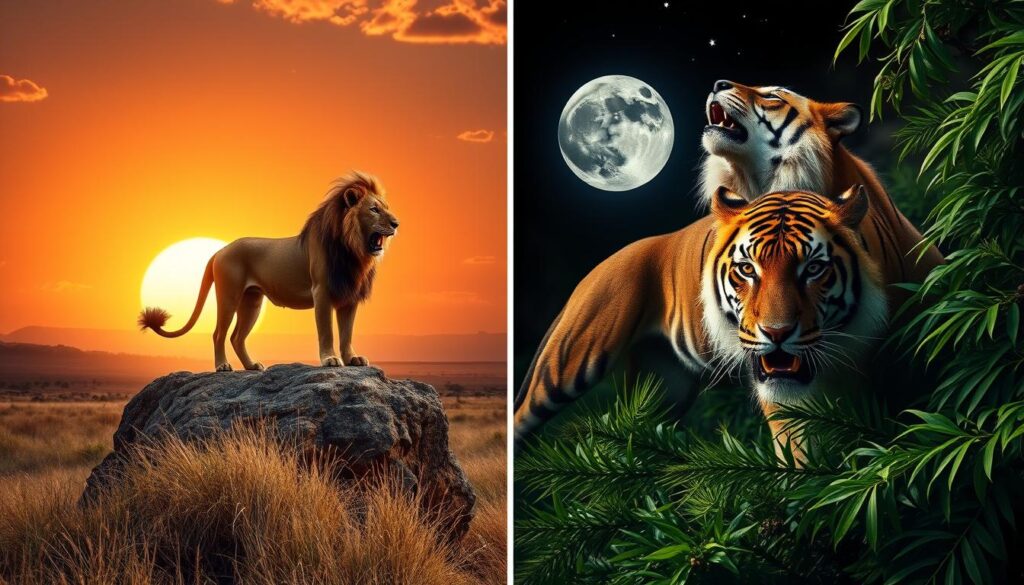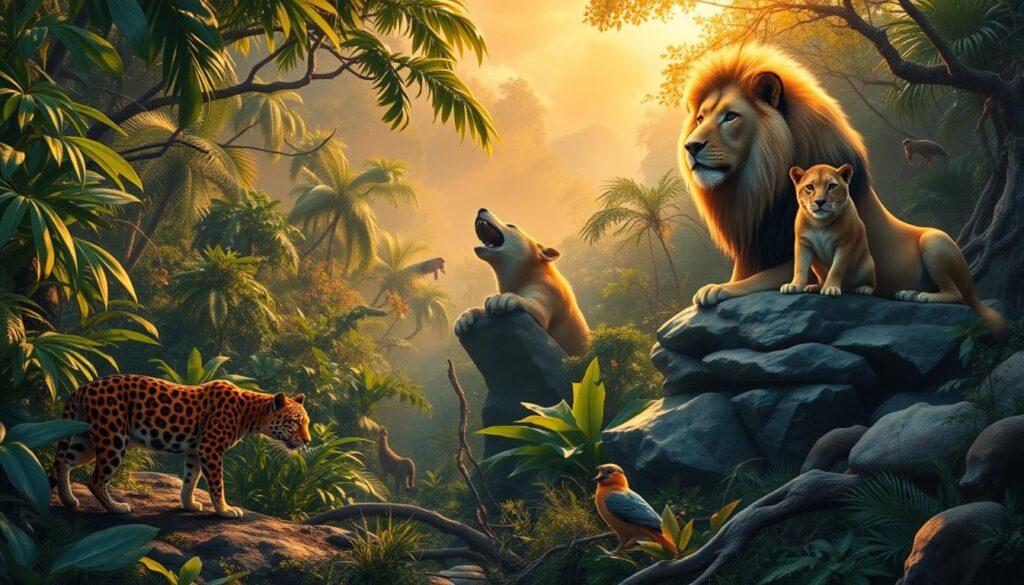
A majestic lion standing on a rocky outcrop in the savannah, illuminated by a setting sun, with its mane blowing in the wind; nearby a sleek, powerful wolf howling at the moon under a starry night sky, and in the foreground, a fierce tiger prowling through dense jungle foliage, showcasing the variety and beauty of carnivores in their natural habitats.
Carnivores are the top predators in the animal kingdom. They have always fascinated humans. These meat-eaters keep ecosystems balanced by controlling the number of other animals. This article will explore the world of carnivores, looking at their traits, how they evolved, and their amazing variety.
Key Takeaways
- Carnivores are meat-eating animals that occupy the top tiers of the food chain.
- These predators have evolved specialized physical and behavioral traits to excel at hunting and catching their prey.
- Carnivores play a crucial role in maintaining the health and stability of ecosystems by controlling prey populations and supporting biodiversity.
- There is a vast array of carnivorous species, each with its own unique adaptations and hunting strategies.
- Understanding carnivores and their importance can help us appreciate the intricate web of life that sustains our natural world.
Understanding Carnivores: Nature’s Top Hunters
In the animal kingdom, carnivores are at the top as nature’s best predators. They live off a diet mainly of meat. This has shaped their evolution and hunting skills over thousands of years.
What Defines a Carnivore?
A carnivore eats the flesh of other animals as its main food. This includes many species, from the big lion to the quick weasel. They have special traits that make them great hunters. These include sharp teeth, strong jaws, and sharp senses for tracking and catching prey.
Evolutionary Adaptations for Hunting
Over time, carnivores have gotten better at hunting. They have many evolutionary changes that help them. These include:
- Acute senses: Carnivores have sharp senses of smell, sight, and hearing. This lets them find and track prey from far away.
- Specialized teeth and jaws: They have sharp teeth and strong jaws. This lets them tear flesh and break bones easily.
- Agility and speed: Many carnivores are fast and agile. This lets them chase and catch their prey quickly.
- Stealth and ambush tactics: Some carnivores, like lions and cheetahs, are great at stalking and ambushing prey. This helps them hunt successfully.
These changes over many generations have made carnivores the top predators we know today. They are the main hunters in the animal kingdom.
Diversity of Carnivores in the Wild

A vibrant jungle scene showcasing a variety of carnivorous species, including a sleek jaguar prowling on the forest floor, a graceful wolf perched on a rocky outcrop, and a powerful lion basking in the golden sunlight, surrounded by lush greenery and diverse wildlife, emphasizing the majesty and diversity of predators in their natural habitat.
The animal kingdom is full of different carnivores, each with its own special traits and ways of hunting. From big cats in the African savannas to sharks in the deep ocean, these animals are key to keeping nature in balance.
The feline family, like lions, tigers, leopards, and jaguars, is a standout group. These powerful hunters are known for their sneakiness, quick moves, and big prey capture skills. They help control herbivore numbers, keeping their ecosystems healthy.
Canines, such as wolves, foxes, and coyotes, are also common in the wild. They use various hunting methods, from hunting together to stalking alone. Their ability to adapt has let them live in many places, from dense forests to open fields.
| Carnivorous Species | Hunting Strategies | Ecological Roles |
|---|---|---|
| Lions | Coordinated group hunting | Regulating herbivore populations, maintaining grassland ecosystems |
| Great White Sharks | Ambush attacks, using their powerful jaws | Controlling populations of fish and marine mammals, maintaining ocean food web |
| Polar Bears | Stalking and pouncing on seals and other prey | Apex predators in the Arctic, controlling seal and other populations |
In the oceans, there’s a wide variety of predators like sharks, orcas, and crocodiles. These sea hunters are vital for keeping their prey populations in check. This helps maintain the balance and strength of marine life.
All carnivores, no matter where they live or what they’re like, play a big role in our planet’s ecosystem. By learning about these amazing predators and their roles, we can better understand nature’s balance and our place in it.
Conclusion
As we end our exploration of carnivores, it’s clear they are key to our ecosystems’ balance. They are vital as the protectors of nature’s complex life systems.
Carnivores have amazing hunting skills and adaptations. They keep the balance in nature by controlling their prey’s numbers. This stops any one species from taking over, making sure the environment is diverse and healthy. This benefits many other species too.
But, carnivores face big threats today. We need conservation efforts to protect them and their homes. By knowing how important carnivores are, we can help save them. This will keep our planet’s balance intact for the future.
FAQs of Carnivores
What defines a carnivore?
A carnivore is an animal that mainly eats meat or other animals. They have sharp teeth, strong jaws, and special ways to hunt and eat their food.
What are the evolutionary adaptations of carnivores for hunting?
Carnivores have many physical and behavioral traits that help them hunt well. They have sharp senses like great vision, hearing, and smell. They are also agile and fast for chasing prey. Plus, they have teeth and claws made just for tearing and eating meat.
How diverse are the species of carnivores found in the wild?
Carnivores are very diverse, with many species living in different places around the world. You’ll find big cats, wolves, sharks, and crocodiles, among others. Each one has its own way of hunting and plays a key role in its ecosystem.
What is the importance of carnivores in the natural world?
Carnivores are crucial for keeping ecosystems balanced. As top predators, they control the numbers of other animals. This keeps their prey healthy. Carnivores also help with nutrient cycling and the food web, making them key to nature’s health.
What are some conservation efforts aimed at protecting carnivore populations?
To protect carnivores, conservation efforts focus on saving their populations. This means creating safe habitats, controlling hunting, and teaching people why these predators are important. Working together is key to saving carnivores and their homes.
